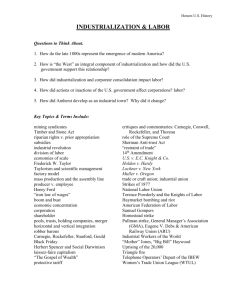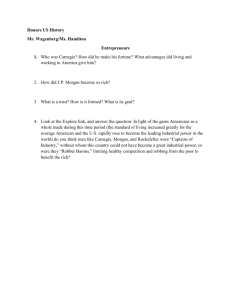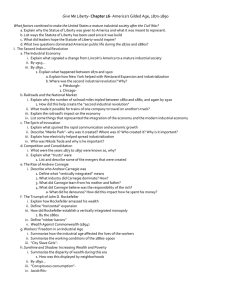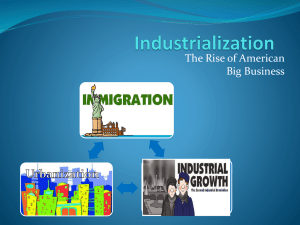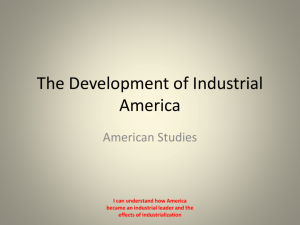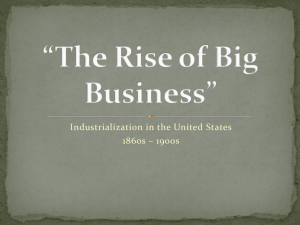Industrialization
advertisement
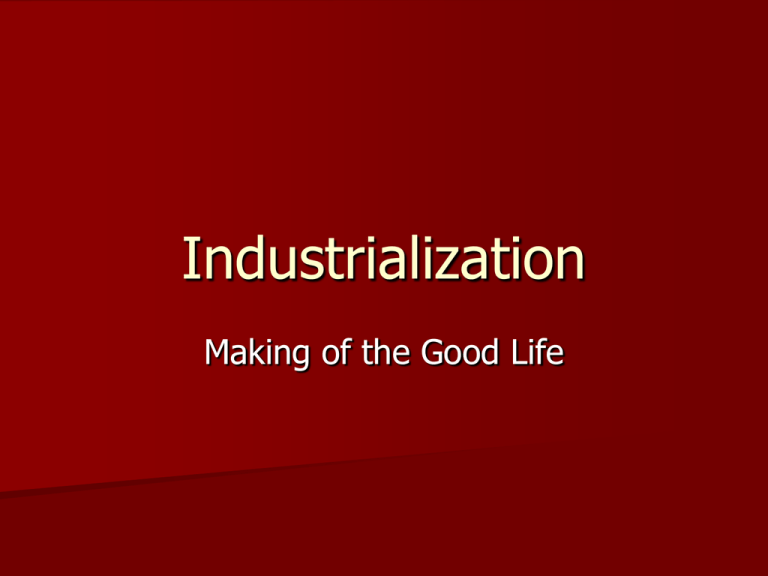
Industrialization Making of the Good Life INDUSTRY Causes of Industrialization Abundant Natural Resources – Lumber, Coal, Oil Labor – Immigrants from Europe & Asia Supportive Governmental Policies Nation’s Cultural Climate INDUSTRY: Effects of Industrialization Increased standard of living Increase in cities Mass Consumerism and increase in prod. Extreme concentration of wealth Better transportation Coal up 800% Farmers out # 3 to 1 Steel up 800% TECHNOLOGY: Impact of Industrialization Major Industries Develop ELECTRIC LIGHT Railroad Telegraph Telephone Cheap Consumer Goods Produced UNIONS: Problems of Industrialization Low wages and poor conditions for workers Small group of wealthy business owners Millions of poor workers No Government regulation Pollution of the Environment 1885 Knights of Labor American Federation of Labor Consequences of Labor Uprising 1886: Haymarket Riot 1892: homestead 1894: Pullman Strike BIG BUSINESS The Mindset of Big Business “The Growth of A Large Business is Merely a Survival of the Fittest” -John D. Rockefeller, founder of Standard Oil “Watch the costs, and the profits will take care of themselves” -Andrew Carnegie, founder of Carnegie Steel BIG BUSINESS CARTELS ASSOCIATIONS Trusts MONOPOLIES INTERSTATE COMMERCE COMMISSION SHERMAN ANTI-TRUST ACT BY 1900: LARGE CORPS DOMINATED The Good Life Social Darwinism –Economic Competition is Natural Law –The Fittest in Business will Survive –Business should not be regulated –The weak companies go under, while the Strong Survive The Good Life Gospel of Wealth –Economically Successful People have the Responsibility to use their money for Charity and Social Purposes Caption reads: "Forty-Millionaire Carnegie in his Great Double Role. As the tight-fisted employer he reduces wages that he may play philanthropist and give away libraries, etc." This cartoon originally appeared in the July 9, 1892 edition of The Saturday Globe, a pro-union weekly out of Utica, New York. The Good Life How to Succeed: Horatio Alger An Ambitious Person can Succeed Financially: if they Work Hard, are Thrifty, Practice Integrity, Follow the Rules, and Have some Luck The Good Life Materialism: –Idea that Material Objects such as Goods and Wealth offer the Highest Values to be Pursued in Life –STOP What are some problems with these Theories? Which do you believe? Were Carnegie and Rockefeller Captains of Industry or Robber Barons? Andrew Carnegie: “Rags to Riches Success Story” Came to the US as a poor 12 year old Scottish immigrant Used vertical integration to control all aspects of manufacturing steel and earn more than $40 million Rockefeller and Standard Oil Company Emphasized Cost Cutting and Efficiency – Undersold the competition Stressed Importance of Customer Loyalty Used the Latest Refining Technologies Advertised Heavily Controlled Transportation: Tanker Cars and New Pipelines Ousting the Competition Rockefeller tried to buy out local refineries Set up Pools: an agreement between several companies that set production quotas and fixed prices By 1879: Rockefeller controlled 90% of the country’s oil-refining capacity Standard Oil Trust Trust: Business Organization which granted trust certificates in exchange for stock. Purpose: Board of Trustees set up to run several corporations as one giant business and establish a monopoly – Are monopolies good or bad for the economy? Business Integration Vertical Integration: Control every part of production and retailing – Ex: If Papa John’s both grew the food to make pizza and then sold the pizza to the public Horizontal Integration: Merge all competing companies into one giant system. – Ex. If Papa John’s bought out all other pizza places like Domino’s, Pizza Hut, etc. Government Regulation Fear that Trusts would raise prices and run out small business Sherman Anti-Trust Act 1890 – Outlawed trusts and any other contracts or combinations in restraint of trade Companies found new ways around law Supreme Court lenient on enforcement
